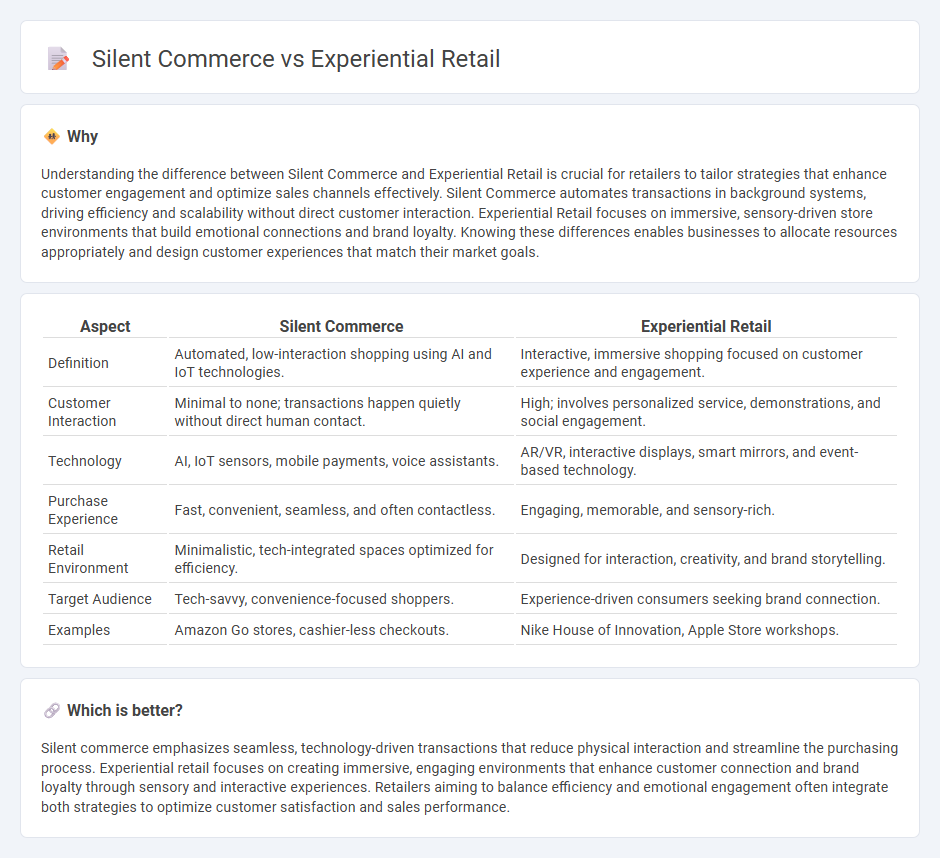
Silent commerce focuses on seamless, technology-driven transactions without direct human interaction, leveraging AI, IoT, and mobile payment solutions to enhance efficiency and convenience. Experiential retail emphasizes immersive, sensory-rich environments where customers engage with products through personalized experiences and interactive displays, fostering emotional connections and brand loyalty. Discover how these distinct retail strategies are reshaping consumer behavior and business models today.
Why it is important
Understanding the difference between Silent Commerce and Experiential Retail is crucial for retailers to tailor strategies that enhance customer engagement and optimize sales channels effectively. Silent Commerce automates transactions in background systems, driving efficiency and scalability without direct customer interaction. Experiential Retail focuses on immersive, sensory-driven store environments that build emotional connections and brand loyalty. Knowing these differences enables businesses to allocate resources appropriately and design customer experiences that match their market goals.
Comparison Table
| Aspect | Silent Commerce | Experiential Retail |
|---|---|---|
| Definition | Automated, low-interaction shopping using AI and IoT technologies. | Interactive, immersive shopping focused on customer experience and engagement. |
| Customer Interaction | Minimal to none; transactions happen quietly without direct human contact. | High; involves personalized service, demonstrations, and social engagement. |
| Technology | AI, IoT sensors, mobile payments, voice assistants. | AR/VR, interactive displays, smart mirrors, and event-based technology. |
| Purchase Experience | Fast, convenient, seamless, and often contactless. | Engaging, memorable, and sensory-rich. |
| Retail Environment | Minimalistic, tech-integrated spaces optimized for efficiency. | Designed for interaction, creativity, and brand storytelling. |
| Target Audience | Tech-savvy, convenience-focused shoppers. | Experience-driven consumers seeking brand connection. |
| Examples | Amazon Go stores, cashier-less checkouts. | Nike House of Innovation, Apple Store workshops. |
Which is better?
Silent commerce emphasizes seamless, technology-driven transactions that reduce physical interaction and streamline the purchasing process. Experiential retail focuses on creating immersive, engaging environments that enhance customer connection and brand loyalty through sensory and interactive experiences. Retailers aiming to balance efficiency and emotional engagement often integrate both strategies to optimize customer satisfaction and sales performance.
Connection
Silent commerce enhances experiential retail by integrating seamless, technology-driven transactions that eliminate checkout friction, allowing customers to focus on immersive brand experiences. Retailers adopt silent commerce elements like IoT devices and AI-powered sensors to personalize interactions and streamline purchasing within physical stores. This synergy transforms traditional shopping into dynamic, engaging environments where convenience and customer experience are deeply interconnected.
Key Terms
In-store Engagement
Experiential retail transforms physical stores into interactive environments, boosting customer engagement through sensory experiences and personalized services that drive higher sales conversion rates. Silent commerce leverages technology such as smart shelves and AI-driven merchandising to facilitate seamless shopping without direct human interaction, optimizing operational efficiency and data collection. Discover how these innovative approaches are reshaping in-store engagement strategies for modern retailers.
Automated Transactions
Experiential retail emphasizes immersive, sensory-rich shopping environments designed to enhance customer engagement and brand connection, while silent commerce focuses on automated transactions that enable seamless, frictionless purchasing without direct human interaction. Automated transaction technologies such as AI-driven checkout systems, contactless payments, and smart vending enable silent commerce to operate efficiently in retail spaces and online platforms. Explore how these innovations are transforming consumer experiences and operational efficiency in the evolving retail landscape.
Customer Journey
Experiential retail enhances the customer journey by engaging multiple senses through immersive, interactive store environments that foster emotional connections and brand loyalty. Silent commerce streamlines purchasing by integrating seamless, contactless transactions within everyday activities, prioritizing convenience and efficiency without interrupting the customer experience. Explore how these innovative approaches redefine retail strategies and optimize customer engagement.
Source and External Links
Experiential retail - Experiential retail is a retail marketing approach where physical stores offer customers engaging experiences beyond traditional shopping, including interactive art, live music, VR, and lounges, targeting primarily Millennials who seek meaningful service experiences as well as products.
What is Experiential Retail? An Inside Look - Experiential retail focuses on creating immersive brand experiences that foster customer engagement and loyalty, rather than prioritizing immediate sales, exemplified by brands like Glossier, which integrates customer interaction into every touchpoint including in-store unique experiences.
6 Best Experiential Retail Examples for 2024 - Experiential retail aims to transform shopping into engaging, sensory-rich experiences through interactive demos, educational workshops, digital tech integration, and community-focused events to deepen customer-brand connections beyond transactions.
 dowidth.com
dowidth.com